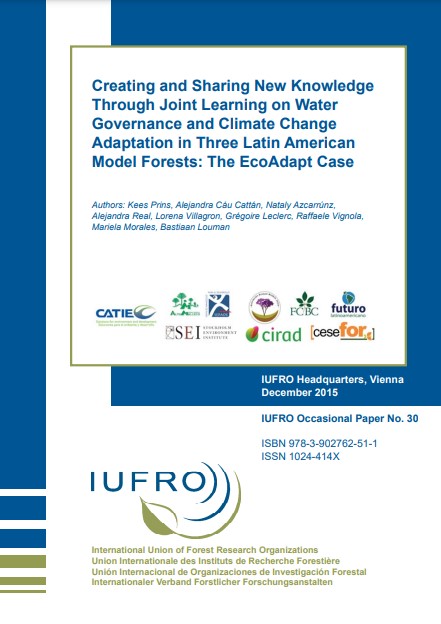Creating and sharing new knowledge through joint learning on water governance and climate change adaptation in three Latin American model forests: the ecoadapt case
Bosque Modelo:
Jujuy
Temática:
Desarrollo humano
Tipo de documento:
Artículo científico
Resumen
Climate change adaptation is about risk management to secure water, food, fiber, timber and other means of livelihood. Although the management of climate risks is a long‐term undertaking, recent climate change trends underline the urgency for active measures in order to improve the resilience of people and landscapes to adverse effects of a changing climate. Traditional knowledge and land management practices may provide a good basis for climate change adaptation, though new science‐based information must be included into what people already know, in order to widen the horizon for change and alternative action, thereby creating a solid basis for developing viable climate change adaptation strategies. To this end, it is essential that the complex issue of climate change is made transparent and understandable to all actors involved, representing an enormous challenge in terms of scope, methods used, and required resources. The EcoAdapt Project: “Ecosystem‐based strategies and innovations in water governance networks for adaptation to climate change in Latin American Landscapes” aims to develop a viable, sustainable civil society response to environmental and climatic challenges, by combining diverse forms of knowledge and by promoting collective action. This endeavor requires a critical mass of motivated and informed local actors; therefore, joint knowledge development and shared learning from different sources and ways of knowing are strategically important aspects of the project. This paper presents the project’s experiences in this respect and compares these with the relevant literature in order to propose a framework for knowledge management and learning. Learning through the project was initiated through a dynamic process that is already showing positive results, including growing commitments and capacities among the local actors in the three EcoAdapt Model Forest areas in Argentina, Bolivia and Chile, respectively. Interestingly, and in contrast with the project’s initial strategy to integrate climate change adaptation into local development, focusing on water security and local development turned out to be a better starting point for collective action and learning than climate change.
Información Bibliográfica
Autor:
Kees Prins, Alejandra Cáu Cattán, Nataly Azcarrúnz, Alejandra Real, Lorena Vilugron, Grégoire Leclerc, Raffaele Vignola, Mariela Morales, Bastiaan Louman
Revista:
IUFRO
Año:
2015
N°:
30
País :
Argentina
Páginas:
-
Volumen:
-
Idioma:
Ingles
Palabras claves
Model forest, Adaptatation, Water, Climate Change





